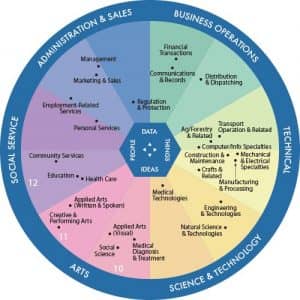4 Tips for Choosing a Major
Many a high school student looks back on the college planning process only to agonize over the selection of a college major. I have two words of advice on that topic.
First, you probably are closer to a major than you think. Do you have academic subjects that you like or do well in? Do you know of some careers or jobs that appeal to you? Answering one or both of these questions puts you close to finding a major.
Second, over two-thirds of college students change their major—not once, but twice—before graduating. (So did they really know their major anyway?)
You are not alone! About a third of entering college freshman profess that they are either unsure of their major (it could be one of three to five choices) or they are totally undecided and have no idea where to turn.
You don’t need to know your major yet.
Remember, you don’t need to know your major when you enter college! As much as people will pressure you, don’t rush to a decision. You can choose to be undeclared. At most colleges, you will need to complete some general education or liberal education courses before you graduate with any major. That first semester or first year is a great time to get those requirements for graduation completed. You won’t be “wasting time” because those courses are needed for the degree—regardless of a major. In completing these courses, you may stumble upon a field or major that excites you. Or a professor may “turn you on” to a discipline that you knew little about. Keep your eyes and ears open.
Here are some tips and sources for additional information on majors and careers.
1. Talk to people who work in careers that interest you.
Spend a day shadowing someone who works in a field you may like. Read about the career. You can find information on many careers by going to the US Bureau of Labor Statistics website. You can read about various careers, their employment outlook and earnings potential, as well as education needed to enter the field.
2. Take an Interest Inventory Assessment.
If you take the ACT exam, you will also complete an Interest Inventory Assessment, which can help you identify possible areas of interest. When registering for the exam, you will go online and complete a series of interest questions (some may seem foolish, but try to answer them honestly). There are no “right” or “wrong” answers—only your answers about how you feel. The report you receive, following the exam, will provide you with very helpful

information on majors and careers.
The ACT’s “World of Work” Map first identifies your preferences for working with PEOPLE, DATA, IDEAS or THINGS. Looking at the ‘pieces of the pie’ closest to your preferred map regions, you will see the career areas your answers indicated potential interests. Looking at the LETTER proceeding each interest area, find that letter under the EXAMPLES OF COLLEGE MAJORS to the right, and see some possible college majors from which you might choose.
3. Enroll in an introductory course.
Another strategy would be to enroll in an introductory course for the major during your first or second semester. Let’s say you had interests in two majors: accounting and biology. Taking an introductory course in each area helps you learn more about the discipline. But just as important, you can talk to the professor about the discipline. You can network with other students in the class who may have already decided upon this major. All of this can go a long way in helping you make a good decision.
4. Utilize career-finding resources.
Finally, don’t forget to utilize the resources of academic advising or the career center. Besides offering information and serving as a sounding board for your thoughts and observations, they can give you access to additional information on majors and careers, or offer you an opportunity to take an Interest Inventory Assessment survey and then go over the results with you, one on one.
Choosing a college major can be an enlightening and enjoyable process if you recognize that it doesn’t need to be done today, there are no “right” or “wrong” choices, and the the objective of this process is to find the right “match” for you! Just remember that old saying “if you find something that you LOVE to do, you will never work a day of your life!”




